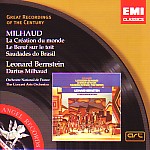What’s not to like? Bernstein’s Milhaud interpretations are lively, intelligent, fun performances that have been in the catalog continuously since the late 1970s, and deservedly so. His version of The Creation of the World doesn’t match the benchmark Weisberg recording on Nonesuch, and some listeners might well prefer Charles Munch, but it’s aptly jazzy if perhaps just a touch more relaxed than is ideal. Le Boeuf sur le toit, on the other hand, is simply delightful, full of character and sensitively alive to the score’s colorful details. Bernstein recorded only four of the Saudades do Brasil, so EMI has thoughtfully included Milhaud’s own 1950s Los Angeles recording. The studio sonics are dry and brash, but certainly adequate, and comparison with Bernstein is very interesting, with very large differences in tempo between conductor and composer, without either version being necessarily preferable. Is this one of the “Great Recordings of the Century”? Perhaps not, but it certainly is one of the most entertaining, with warm and pleasing sonics (for the Bernstein items) in this latest remastering. [4/6/2006]
































